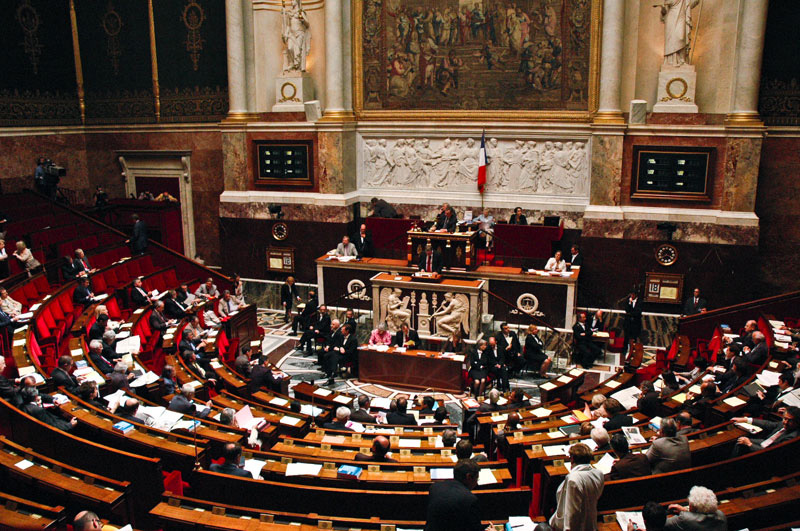The second round of the French parliamentary elections on Sunday saw Macron’s centrist alliance Ensemble (Together) lose the absolute majority it had enjoyed in the National Assembly for the past five years, casting fears that France will get stuck in political limbo for months, or even years.
The results follow Emmanuel Macron’s victory in the presidential runoff against far-right candidate Marine Le Pen in April, which made Macron the first French president to win a second mandate in over two decades.
But the parliamentary runoff saw the breaking of another political record, this one much less gratifying for Macron: last Sunday’s poll results mark the first time a newly elected president falls this far short of an absolute majority since the current French governing system began 64 years ago.
Macron’s Ensemble alliance won 245 seats in the National Assembly, well short of the 289 seats required for an outright majority.
The new left-wing coalition NUPES (New Ecological and Social Popular Union) led by Jean-Luc Mélenchon, the spearhead of the hard-left France Unbowed party, came in second with 131 seats.
Marine Le Pen’s far-right National Rally (RN) got a record number of 89 seats, a major advance on the eight seats they won at the previous parliamentary polls in 2017, earning them a significant role as the main right-wing opposition force in parliament – even before the traditionally conservative Les Républicains party, which won 61 seats.
In addition to losing his parliamentary majority, Macron also lost two of his most experienced parliamentary allies: the outgoing National Assembly speaker Richard Ferrand and Macron’s Renaissance party parliamentary leader Christopher Castaner both lost their seats, which will likely lead to their resignation.
A low-turnout vote with 53,77% of abstention, Sunday’s parliamentary polls saw voters essentially deny President Macron the majority parliament he needed to carry out his ambitious agenda of welfare reform, tax cuts, and raising of the retirement age; demonstrating a growing sentiment of profound disillusionment and frustration among the French population.
Following the ruling party’s poor results, French Prime Minister Elisabeth Borne offered her resignation to Emmanuel Macron, which France24 explains is “customary” following an election defeat.
Macron, however, turned down Borne’s resignation offer, insisting on pushing forward.
According to a presidential official who asked to remain anonymous, the president believes the government needs to “stay on task and act” in order to find “constructive solutions” to circumvent the nightmare scenario of a five-year-long political deadlock.
What happened?
Analysts point to Macron’s muted, if not inexistent parliamentary campaign, and to his reliance on what was perceived as a strong-enough momentum after his re-election in April as he topped the polls of the presidential runoff throughout.
But Macron’s aloof approach to the parliamentary elections only reinforced his unpopular public image as an arrogant ruler with an unyielding top-down governing style.
And even if a large portion of French society indeed supports Macron, the head of state remains extremely unpopular among French voters on left and right alike. During the second round of the presidential runoff on April 24, which, as in 2017, opposed Macron to Marine Le Pen, millions of left-wing voters cast their ballots for Macron, not out of sympathy for the centrist candidate, but to keep the far-right out of the presidential office.
For the left-wing coalition, preventing the far-right candidate from accessing power was always a clear priority, but so was their plan to win a National Assembly majority and force Macron into a state of “cohabitation” with Mélenchon as his Prime Minister.
“We know who we will never vote for… Not a single vote must go to Mrs Le Pen,” Mélenchon said after he was beaten at the first round of the presidential runoff in April.
Lack of consistent campaigning failed to mobilise the voters sympathetic to the ruling party Ensemble and provided the virulently anti-Macron movements with the mediatic and political steppingstone necessary to gain seats in the National Assembly.
What baffled analysts is the fact that Marine Le Pen’s campaign was also substantially lacklustre – she went on holiday after losing the presidential election to Macron, for instance. Yet her party achieved extraordinary results.
“There were no polls predicting this and I haven’t seen anybody predicting it,” said Paul Smith, a professor of French politics at Nottingham University. “Le Pen was looking washed up after the presidential second round; so many people thought that was it for her – and she herself wasn’t really campaigning for the législatives. But clearly, that wasn’t it.”
The poll results outline a growing trend of general disillusionment and anti-system sentiment among the French population, raising concern about a possible future turn towards far-right populism, including on the part of habitual voters of the hard-line left.
“The simple explanation for RN’s success tonight is that this was an anti-Macron bloc,” said Paul Smith.
Even if Mélenchon invited his supporters not to vote for Le Pen, quite a lot of them did. It’s clear that hatred of Macron is sufficiently intense for a lot of NUPES voters to be able to vote for RN.”
According to the polls for the second round of the presidential elections, between 16% and 27% of Mélenchon voters were considering casting their ballot for the far-right National Assembly.
Related articles: Islamophobia in France: How Right-Wing Politicians Promote Opposition Against Muslim Communities | French Presidential Elections: Why Absenteeism Is A Dangerous Choice
Macron’s options moving forward
The new assembly will be voting on its confidence in the new government either on July 5 or soon after.
In the meantime, Macron will be meeting leaders of the opposition parties on Tuesday and Wednesday at the Elysée Palace, in the hope to find a majority by forming alliances.
His preference clearly lies with the more traditional right-wing party Les Républicains, who have enough seats to help Macron pass reforms, but their party has already been considerably weakened by a poorly led presidential campaign and fears that a close association with an unpopular president will shatter their chance to rebuild political power.
A long-term alliance with Les Républicains is further compromised by the fact that their leader Christian Jacob repeatedly stated his party would “remain in opposition” despite hinting at Les Républicains’ willingness to support Macron from time to time.
In the long term, Macron and his party may have to rely on ad hoc votes from different blocs of the Assembly every time a different issue or reform plan is brought up.

In the past years, Macron had exercised his presidential function with a top-down approach, largely ignoring Parliament where his party had swept 350 seats in the 2017 elections, securing a strong legislative foothold for the president’s agenda.
Sources close to Macron even suggested to the French media the president may be tempted to call another election – however, according to the French constitution, he would have to wait 12 months.
The sad and concerning picture of a deeply fragmented political landscape adds to a long list of gathering threats: war on the European continent, energy crisis, rising living costs, and, last but not least, an impending climate breakdown.
The fact that none of these issues was raised during the législatives calls into question the government’s awareness of the problems and the sincerity of its pledges to tackle them – particularly climate issues, considering the French government’s lack of consistent environmental agenda and persistent disregard for EU environmental laws and recommendations.
Proposals on renewable energy scheduled for later in the summer will test the leftist alliance as parties are divided over nuclear power.
But if they cannot retain common cause, as projected – Mélenchon’s recent proposal to make NUPES a permanent left-wing bloc has been immediately rejected by the other member parties – they will not only fail to address the climate crisis as promised during their campaign but, as professor of French politics at Warwick University Jim Shields put it, they will clear the room for Marine Le Pen’s National Rally to essentially become “the biggest party of parliamentary opposition,” enabling it to turn the National Assembly into its very own political platform.
Editor’s Note: The opinions expressed here by Impakter.com columnists are their own, not those of Impakter.com. — In the Featured Photo: A torn campaign poster image of Emmanuel Macron. Source: Guilhem Vellut/Flickr.










